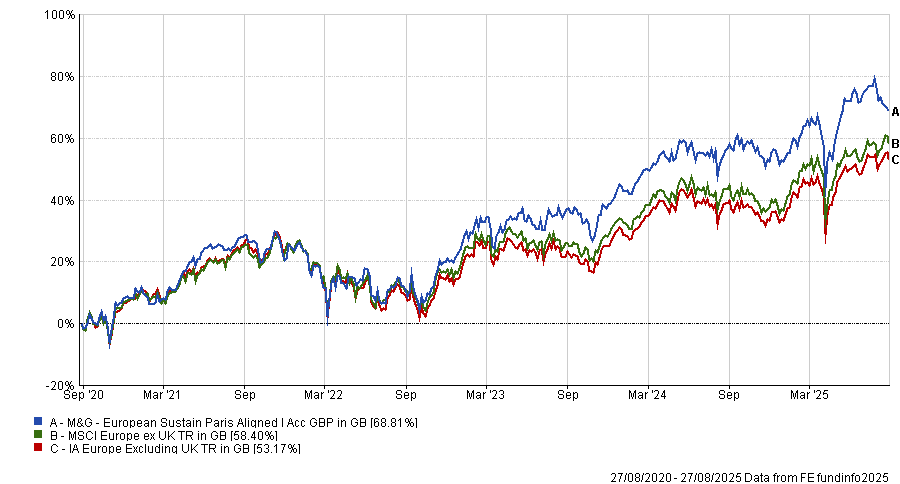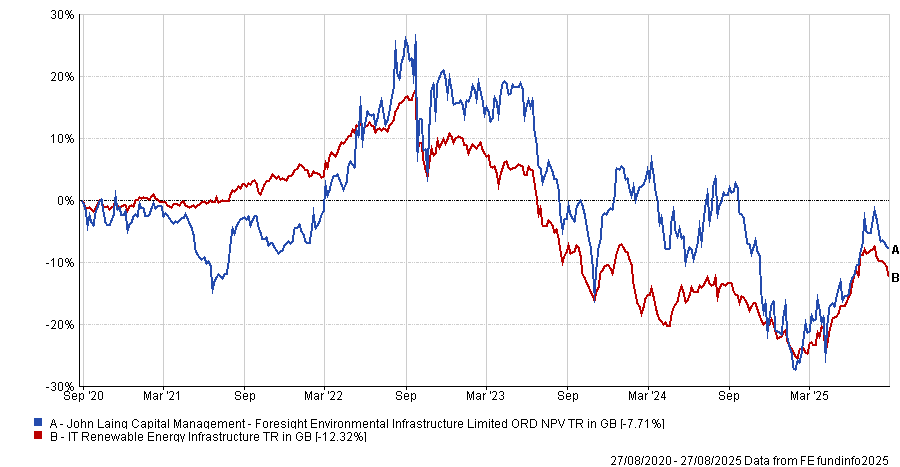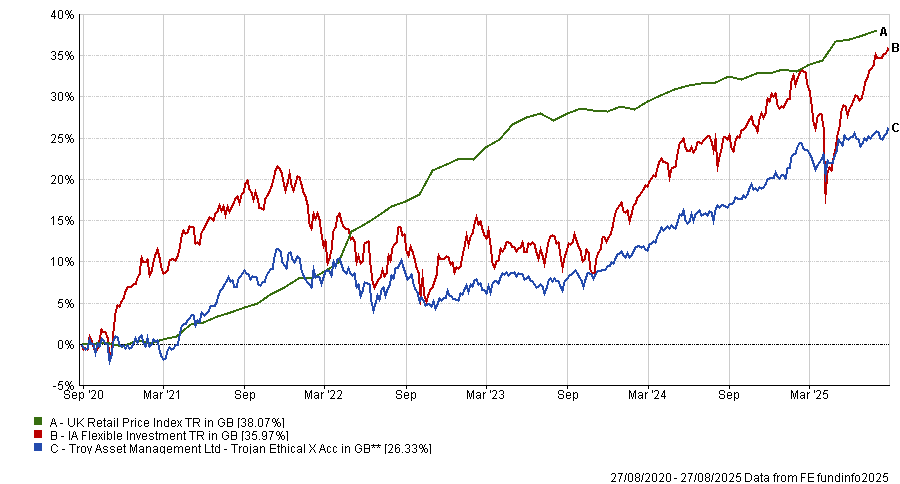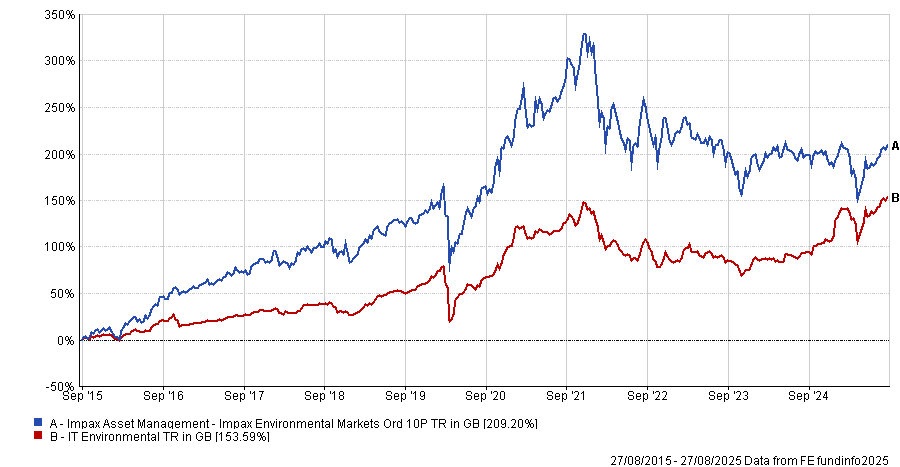Sustainable investing has lost some of its shine in recent years but that does not mean investors have to shelve their environment, social and governance (ESG) concerns until the broader market swings back around.
Mounting political scrutiny and division, higher interest rates and energy sector outperformance have all contributed to what has been described as a cyclical downturn in a structural uptrend, leaving many sustainable funds and their managers deflated.
However, opportunities remain for investors who are selective. Below are some sustainable alternatives suited for growth, defensive, income and quality strategies.
Growth
For investors pursuing growth, Paul Angell, head of investment research at AJ Bell, pointed to M&G European Sustain Paris Aligned.
The fund was repurposed in August 2021 to formally align with the 2015 Paris Agreement, which commits country signatories to limiting global warming to ‘well below’ 2°C compared to pre-industrial levels by the mid-century.
It also has a ‘Sustainable Improvers’ label under the UK’s Sustainability Disclosure Requirements, which is for funds targeting companies transitioning to become more sustainable over time.
Manager John William Olsen’s focus on ‘compounding companies’ gives the fund its “quality-growth tilt”, according to Angell, as he focuses on stocks with competitive advantages in their respective industries that are expected to deliver durable earnings and maintain strong balance sheets.
“This clear investment approach, where the manager also seeks to initiate positions at an attractively priced entry point, has been ever present through Olsen’s career and has consistently rewarded investors with outperformance over time,” Angell said.
The fund has lagged its peers in recent months and has logged an 8.3% total return over one year. However, M&G European Sustain Paris Aligned is a top-quartile fund over three, five and 10 years, managing total returns of 52.6%, 70.6% and 165.5% respectively.
Performance of fund vs sector and benchmark over 5yrs

Source: FE Analytics
The portfolio has a weighted carbon intensity 50% or less than the MSCI Europe Ex UK index, applying exclusionary criteria in line with the goals of the Paris Agreement.
Income
James Carthew, head of investment company research at QuotedData, said: “In the income category, there are many renewable energy companies to choose from that offer high yields and can be acquired at big discounts to their net asset value [NAV].”
He picked Foresight Environmental Infrastructure, noting that the investment trust offers investors exposure to a broadly diversified portfolio while boasting an almost 10% yield and 23.3% discount to NAV.
“The company is rationalising its portfolio to concentrate more on renewables, energy storage and sustainable resource management assets that can generate long-term, stable, inflation-linked cashflows,” Carthew explained, which has resulted in it selling off more mature assets.
The capital freed up will support the trust’s ongoing share buyback programme which aims to narrow the discount.
The investment trust managed a 40.8% total return over 10 years, beating the 36.9% average delivered by the IT Renewable Energy Infrastructure sector. However, performance has been volatile, with the trust recording a 26% loss over three years and a 17.8% resurgence over six months.
Performance of trust vs sector over 5yrs

Source: FE Analytics
Defensive
For a defensive sustainable fund pick, Angell suggested Trojan Ethical. Charlotte Yonge is the manager of the multi-asset fund and puts a “high degree of emphasis on capital preservation”, he said.
“The fund has an exclusions approach to ethical investing spanning tobacco, pornography, fossil fuels, alcohol, gambling and high interest lending.”
It invests in equities (35%), developed market government bonds (50%) and gold bullion (10%).
“Equities holdings are typically concentrated with a preference for higher quality, cash generative, businesses,” Angell said. Top holdings include Alphabet, Unilever, Visa and Microsoft.
The £885.8m fund’s long-term performance has been strong, delivering a solid return profile with less volatility than wider markets, according to Angell, although he noted there is no guarantee it will protect capital over time as it does still invest in equities.
The fund was in the second quartile for total returns over one year against its sector, managing an 8.4% return.
Performance of fund vs sector and benchmark over 5yrs

Source: FE Analytics
Quality
For investors pursuing quality, Emma Bird, head of investment trusts research at Winterflood, selected Impax Environmental Markets.
The £802.1m investment trust has a global portfolio spanning 52 holdings covering eight sustainability themes, including energy management and efficiency, digital infrastructure and sustainable food and agriculture.
It has been managed by Bruce Jenkyn-Jones, who is set to retire next year, and Jon Forster since its launch in 2002. Fotis Chatzimichalakis became a co-manager in 2021.
“The managers are highly experienced and supported by the significant and focused resources of Impax Asset Management, with the specialist nature of the management group enabling in-depth knowledge of the market and the evolving regulatory landscape,” she said.
The trust itself performed “particularly well” relative to global equities between 2020-21, when growth stocks were in favour and ESG issues were top of mind during the Covid-19 pandemic, Bird said.
Performance of trust vs sector over 10yrs

Source: FE Analytics
However, the changing market environment since has led to a reversal in this relative performance and the shares have been de-rated.
“If ESG factors regain prominence in investment decision-making in the coming years as interest rate and inflation concerns subside, we would expect Impax Environmental Markets to be a key beneficiary in terms of both underlying portfolio performance and share price rating,” said Bird.
In addition, a falling interest rate environment could provide a positive tailwind for the portfolio’s overweight allocations to small- and mid-caps and growth stocks, she suggested.
Impax Environmental Markets is currently trading on a 9.6% discount to the NAV, which she described as offering value and “limited” downside risk. It also offers a 1.3% dividend yield.





